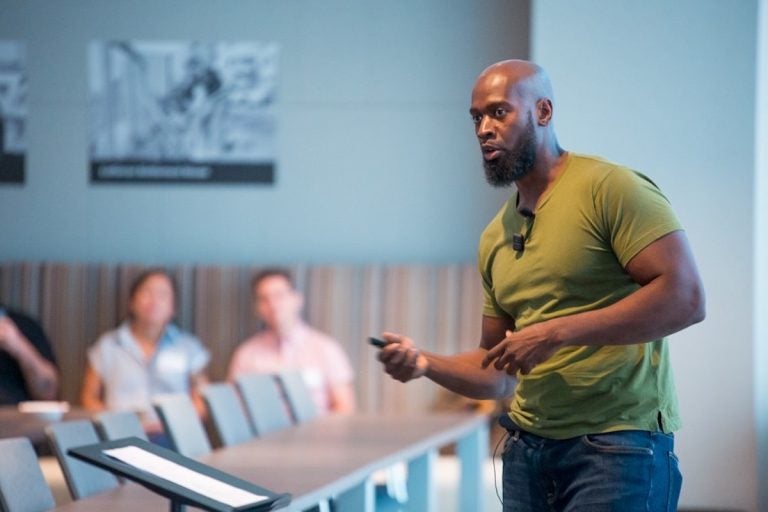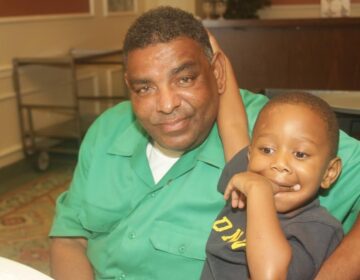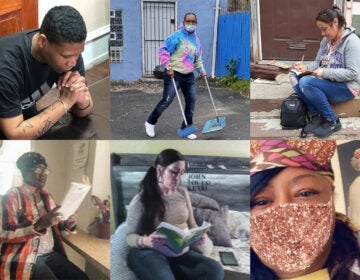Detained, but not deterred
As a formerly incarcerated individual, I am determined to write the narrative instead of letting someone else write it about me.

Derrick Cain (Photo by Steve Weinik)
Contrary to a lot of negative stories you read about people not having both parents or coming from a broken home, I had a very loving family and upbringing. I was fortunate to have both parents in the home and three siblings. My parents raised me to believe that I would always have options. They also taught me that there would always be consequences for whatever decisions I made.
Growing up, I had friends who were involved in drug activities and always had large amounts of money. I was never interested in taking part in that because I had a decent job. As time went on, I had my first child, my wife was a full-time nursing student, and my income wasn’t enough to cover all the household expenses. I didn’t have a lot of patience and I felt that I wasn’t college material.
I thought that for me to be successful and achieve my goals — to care for my family and open my own real estate business — that I had to take a different route. I didn’t have the skillset to bring in the kind of money I would need. After applying for loans and being denied by several banks even though I was employed, I grew frustrated and turned to the streets. The streets had “options” and some of those options could net the kind of money I needed. So I decided selling drugs was the best option for me (or so I thought at the time).
Everything was going well until that fateful day when my name was called to answer for the choices I made over the years. On April 12, 2005, the Montgomery County police kicked the door in, and life as I knew it would never be the same again. Although this was my first offense, I was sentenced to a mandatory minimum of 10 years in federal prison. At my sentencing hearing, I looked at my lawyer in disbelief. “Do something,” I shouted silently. Four to five years was supposed to be the guideline for a first offense like this. 10 years? What I didn’t understand at the time was it didn’t matter if it was my first offense. By federal law, the charge carried a mandatory minimum of 10 years. This was my painful introduction to mandatory minimums under federal law.
I had no choice but to accept my sentence. Remembering what my parents taught me, I chose to take this time to focus on being the best version of myself I could be. And as hard as it might have been for me, I was reminded with every visit that first year how devastating it was for my family, especially my mother and my children. Visits ended in tears and, not understanding I was locked up, my three-year-old son would always ask why I couldn’t go home with them. My mother’s embarrassment and frustration showed all over her face during those visits and it took several years for her to get used to the fact that her oldest son was in prison.
A year into my sentence, the Philadelphia Daily News featured me in a story about the mandatory minimum law that resulted in a surge of federal inmates. The article highlighted the fact that it was my first brush with the criminal justice system. Despite me being a family man with a good job, despite pleading guilty to the charges, the judge’s hands were tied. At my sentencing, U.S. District Judge Legrome Davis was quoted as saying, “There’s nothing anyone here can do or say to get you below 10 years.” A 2010 survey by the U.S. Sentencing Commission of 639 federal judges found that 62% of them believed that mandatory minimum sentences were too high.
The following week, a man named Rich Kraus responded to the Daily News article and wrote in the comments section of the paper that I was “not a good son or husband,” that I was “certainly not a good father,” and that I was just a “drug dealer.” I couldn’t believe how someone could make those inaccurate comments about someone they didn’t know. Yes, I made some bad decisions, but those comments were not true. What was more important to me was how my family felt about me. During those frustrating nights my mother lay in bed, did she think I wasn’t a good son or father? This stranger’s comments forced me to doubt the opinions of the people who mattered the most. Did they think the same thing about me?
Since 2011, I have carried a laminated copy of Rich Kraus’ comment in my wallet as a constant reminder of how I was viewed. This stranger’s opinion of me was my introduction to how felons are painted with a broad brush. His comments made me work as hard as I could to change the narrative. To the people that mattered most, I wanted them to know that despite some bad decisions, I was a good person. I was determined to prove it to them — and to myself.

Upon my release, I started volunteering with Families Against Mandatory Minimums (FAMM) as an advocate, panelist, and motivational speaker. I also went through a program with Menzfit, an organization that provides interview clothing and financial literacy services, and less than three months after completing the program, I began volunteering, speaking and mentoring other returning citizens.
I’m passionate about shifting the news paradigm and connecting with people. Celeste Trusty, FAMM’s Pennsylvania state policy director, saw my passion for telling accurate and authentic stories and suggested I apply for a criminal justice fellowship with The Reentry Think Tank. I applied and was accepted. During my fellowship, Jean Friedman-Rudovsky, the co-executive director of Resolve Philadelphia, a journalism organization that promotes equity, collaboration and sustainable solutions, was a guest speaker and she introduced me to solutions journalism, rigorous reporting on impactful responses to social and economic problems, rather than just the problems themselves. I felt like that was the type of journalism I found most interesting. And I wanted to work with people in communities that I know, often written off or stereotyped. A few weeks later, I decided to take another step on my journey by applying for a job opening at Resolve.
As a formerly incarcerated individual, I understand firsthand the negative perception and stigma that is often associated with people such as myself. I am determined to write the narrative instead of letting someone else write it about me. Today, when I opened my wallet, alongside that laminated comment that tormented and inspired me is my new business card that reads:
Derrick Cain, Community Engagement Editor, Resolve Philadelphia
WHYY is your source for fact-based, in-depth journalism and information. As a nonprofit organization, we rely on financial support from readers like you. Please give today.




